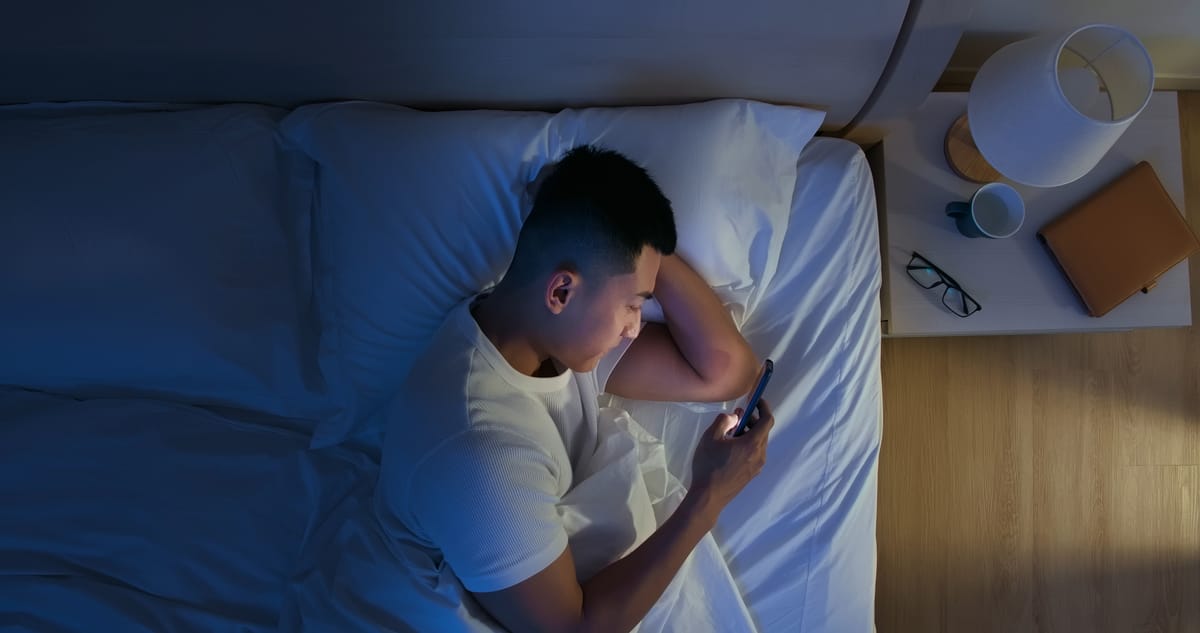How Your Smartphone is Affecting Your Sleep
Scrolling through your phone before bed might feel relaxing, but it can actually disrupt your sleep quality and make it harder to function the next day—read on to discover how your late-night screen habits are affecting your rest and what you can do about it.

By: Carly Tino & Jake Hreha
Saying it's common to be active on your phone before bed is an understatement. In fact, according to BusinessInsider.com, 95% of people use their phone just before going to bed, and 90% of 18- to 29-year-olds sleep with their phones.
To most people, these statistics aren't shocking; we live in a digital age driven by our electronic devices with small screens and bright light, and there are so many digital distractions that compete for our attention. Shocking or not, what do these figures mean and how do they affect our sleep cycle?
Why Phone Use Before Bed Leads to Poor Sleep
Numerous studies show that screen time before bed has a profound effect on our sleep patterns, leading to various sleep disturbances. When we turn our phones off, our brains don't immediately follow suit. Cleveland Clinic reports that using our cell phones before bed keeps our brain psychologically engaged and affects our rapid eye movement (REM) sleep.
“Checking your phone stimulates the brain so we are more active and awake,” says sleep medicine expert Michelle Drerup, PsyD, DBSM. “Even just a quick check can engage your brain and delay sleep.” Phone use affects our sleep wake cycle and internal body clock, leading to poor sleep quality and trouble falling asleep. Phone use before bed also means shorter sleep duration because of time spent looking at the bright lights our electronic devices emit.
Blue light emitted by your phone also poses a threat to your sleep habits by restricting your production of melatonin, the hormone that regulates your sleep-awake cycle. Low melatonin production can dramatically decrease feelings of sleepiness. In addition, exposure to blue light contributes to the development of retina damage. This is just one of many reasons why limiting screen time before bed is important for good sleep quality and hygiene.
How Mental Stimulation Keeps You Awake
Just like watching a violent movie before bed can cause disrupted sleep, so can a controversial social media post. The hours before sleep should be the time when your brain is exposed to calm, relaxing stimuli – and a lot of social media content is far from this. For quality rest it's important you are in a relaxed mental state. While it's tempting to keep your mind engaged in the hour before bed, it is better to slowly let your mind relax in the evening and disengage from technology. It's safe to say if you go to bed with your phone, you'll probably have poor sleep quality.
Cell phones aren't the only electronic devices that incite a poor sleep cycle. Other electronic devices like a laptop and activities such as watching tv can cause sleep deficiency. Use of electronics leads to sleep latency making it more difficult to fall asleep at an ideal bedtime. The best option is to make the bedroom and time before bed a screen free zone to maintain a healthy sleep schedule.
Sleeping Is Important
Based on the research, it's clear that smartphone usage before bed is not ideal for your sleep or mental well being. Your circadian rhythm can be affected making it more difficult to fall asleep. But why is getting quality sleep so important in the first place?
Lack of sleep can lead to a host of issues affecting mental health, behavior, memory, emotions, and learning. Excessive daytime sleepiness affects many aspects of our lives, particularly when we do not get enough sleep. Examples include:
- Inattention, irritability, hyperactivity, poor impulse control, and difficulty multi-tasking
- Impaired memory
- Impaired math calculation skills
How to Fall Asleep Without Your Phone
When you don't get enough sleep, you go into “sleep debt.” Your body and brain are tired, so they try to get sleep whenever possible, which can result in microsleeps. These microsleeps can last just seconds, affecting your ability to retain information.
So, what is the solution, besides locking the phone away hours before bed? Here are a few suggestions:
- Invest in blue light blocking glasses, which shield your eyes from blue light emissions. Or, ensure that you have a blue light filter enabled on your phone for the evenings.
- Aim to set the phone down at least 30 minutes before you fall asleep.
- Sleep with your phone out of reach. This will protect you from the temptation of grabbing it from your bedside table. If you wake up in the middle of the night, this will also remind you to avoid using your phone before falling back asleep.
- Replace your pre-bed phone usage time with another enjoyable, relaxing activity, like reading a book, journaling, or listening to a calm playlist or podcast.
- Free yourself from the pressure of responding to others at a moment's notice. Protecting your sleep may lead to more delayed responses on your part, but remind yourself that this boundary benefits you and your overall health. Don't let an alert on your phone induce stress in the most relaxing period of your day. It's okay to let your alertness slip when your head hits the pillow.
If you feel you must use your phone during the night consider switching to night mode, which turns on a blue light filter. This reduces the negative effect of blue light by reducing the amount your phone displays. Many phones have the ability to set this feature on a daily schedule so you can begin decreasing your blue light exposure during the evening hours.
Start Sleeping Better Tonight
As you begin to prioritize sleep, your ability to concentrate, learn, and absorb information will flourish. The better you sleep, the better you’ll function while you’re awake—helping you become the best version of yourself, both in and out of the classroom.
At Indiana Wesleyan University, we’re here to support that journey. From academic excellence to personal wellness, IWU is committed to helping you grow—mind, body, and spirit. Whether you're just beginning to explore your future or ready to take the next step, we offer programs designed to help you thrive and make a meaningful impact. Find your program today!
Carly Tino
Social Media Manager, IWU-National and Global
Carly Tino grew up in Northeast Indiana and graduated from Indiana Wesleyan University in 2020, where she studied Strategic Communication and Media Communication. Carly’s favorite pleasures of life are morning pour-overs, traveling in her soon-to-be-finished camper and going to the lake with her family. She lives in Fort Wayne, Indiana, with her husband, two cats, and dog.
Jake Hreha
SEO Copywriter, IWU
Jake Hreha is a graduate of Ball State University, where he majored in advertising with a concentration in media presentation and design. He is passionate about design, and in his free time he enjoys cycling, traveling, and reading.




